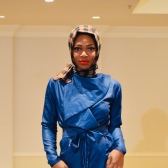On February 1, 2018, World Hijab Day was observed and encountered opposition from an unlikely source. A number of Black Muslims were taken aback on February 13,
 when 10 feminist faculty members of Spelman College released a letter expressing their concerns with the Spelman student who organized fellow students and Spelman faculty who participated in World Hijab Day. It included concerns about the women around the world who protest World Hijab Day
when 10 feminist faculty members of Spelman College released a letter expressing their concerns with the Spelman student who organized fellow students and Spelman faculty who participated in World Hijab Day. It included concerns about the women around the world who protest World Hijab Day  and Muslim women who are forced to wear the hijab (in Saudi Arabia and Iran) with violent consequences if they refuse. While the authors took great care to express their thoughts and concerns about Muslim women who wear hijab from around the world, their failure to mention the many Muslim women who chose to adhere to a command from God to cover their hair, speaks to their incomplete or misunderstanding of hijab. Unfortunately, many people, fail to grasp and comprehend our perspective. It is so foreign to them why any woman would want to cover her hair every time she walks out the door, so contrary to their order of freedom and justice, that it just does not compute.
and Muslim women who are forced to wear the hijab (in Saudi Arabia and Iran) with violent consequences if they refuse. While the authors took great care to express their thoughts and concerns about Muslim women who wear hijab from around the world, their failure to mention the many Muslim women who chose to adhere to a command from God to cover their hair, speaks to their incomplete or misunderstanding of hijab. Unfortunately, many people, fail to grasp and comprehend our perspective. It is so foreign to them why any woman would want to cover her hair every time she walks out the door, so contrary to their order of freedom and justice, that it just does not compute.Why do some women care what or how Muslim women dress? This feigned concern for the rights of Muslim women “forced to wear hijab” seems to be a double standard. The Spelman faculty wrote about the women in Iran who are protesting the laws requiring them to wear hijab. However, there were few if any historical protests for the women in Iran in the late 1930’s when they were forced to remove their hijab with violent consequences if
 they did not. It was unlawful for them to wear hijab. Women were relegated to their homes because they could not, would not come out uncovered. That was so long ago you may think, however, in Turkey until 2013, just five years ago, it was unlawful for women to wear hijab to government offices, hospitals, universities, and schools. That meant Muslim women who wore hijab could not go to school, to the hospital, work for the government or go to university. Where was the outcry for those women who only wanted to show their devotion to God?
they did not. It was unlawful for them to wear hijab. Women were relegated to their homes because they could not, would not come out uncovered. That was so long ago you may think, however, in Turkey until 2013, just five years ago, it was unlawful for women to wear hijab to government offices, hospitals, universities, and schools. That meant Muslim women who wore hijab could not go to school, to the hospital, work for the government or go to university. Where was the outcry for those women who only wanted to show their devotion to God?Read More On Sapelo Square
No comments:
Post a Comment